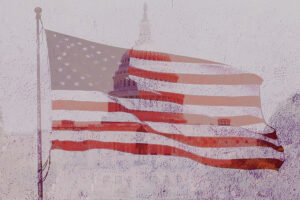On Nov. 11, three days after the presidential election, a panel hosted by the Initiative on Catholic Social Thought and Public Life in Gaston Hall sought to explain the outcome of the election and its meaning in the context of the Catholic vote. Panelists painted a picture of a divided country where faith provides less straightforward political guidance than it has in the past.
Panelists included E.J. Dionne, a Washington Post columnist and McCourt School of Public Policy professor, Elizabeth Dias, Time magazine religion correspondent, Michael Gerson, Washington Post columnist and former George W. Bush advisor, and Bob Costa, a Washington Post political reporter who covered the Trump campaign. Director and founder of the Initiative on Catholic Thought and Public Life John Carr moderated the panel. Executive Director of Institute of Politics and Public Service (GU Politics) Mo Elleithee introduced the speakers. GU Politics co-sponsored the event.
Elleithee began by acknowledging the surprise of Donald Trump’s victory on Nov. 8. “Every paradigm we thought existed was thrown out the window,” he said. “We just had an election that was not about left versus right; it was about something else.”
Carr explained that the focus of the panel would be on interpreting the facts of the election through the lens of faith and Catholic social teaching, a doctrine that values individual humanity. “The exit polls show us a lot but they do not show us the lives that are at risk, the dignity that is at risk,” he said. “We’re going to try to look at this through the lens of faith, through the lens of Catholic social teaching, and as Pope Francis would say, in some ways even bottom up.”
The panelists did discuss the results of exit polls, including voter religious and racial demographics. They also drew on their own experience reporting and writing about politics and Christian voters. Costa described his interpretation of the evolution Trump’s populist message, saying that Trump was initially unaware of the significance of his rhetoric. “This is someone who found his way to the White House,” he said.
Gerson saw a backlash against multiculturalism as one explanation for the upset of the election, as white Christians in particular see themselves become a minority for the first time. “That was disorienting. That is a disorienting change for many Americans who don’t see the America they grew up with,” said Gerson of this demographic shift.
Dionne addressed Catholics as a voting bloc, a group which he said has become less cohesive in this election. “There is no distinction between the way white Catholics voted and the way that everyday people vote,” he said. He went on to cite statistics suggesting that Latino Catholics voted like other Latinos, and white Catholics voted like other white voters. “I worry very much that we’re not voting our values, we’re voting out of a tribal, a kind of tribal commitment,” Dionne said.
The panel discussed evangelical voters as well, a bloc which overwhelmingly voted for Trump. “They feel like outsiders in America, outsiders in their own country because of their faith. They see the state as a threat, a threat to them and to their church,” Costa said. Dias pointed out that most American Christian groups voted for Trump, while other religious groups voted for Clinton. “I’m left wondering how much of this election is really about religion. I don’t really think so,” she said, noting that evangelicals tend to have lower levels of education and income that other groups.
Gerson spoke about the overlap between conservative Christians and evangelicals about their focus on religious liberty. “If Christianity is about the defense of your own institutions, your own rights, then there’s something missing here,” Gerson said. To him, Christianity means acknowledging the worth of each person. “It’s the doctrine of human dignity that Christians have brought to the public discourse,” he said. The panel took questions from the audience to finish the event, as students asked about the future of the Democratic Party, the role of sexism in Clinton’s loss, and how Trump plans to heal the racial divides he has caused.
To Dias, a key problem of this election is the sacrifice of humanity for political expediency. “Even if Democrats had targeted religious voters in different ways and different groups, would that have gotten us out of this mess when no one really listens to each other?” asked Dias. “I don’t think so.”





